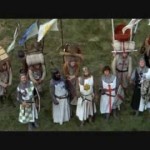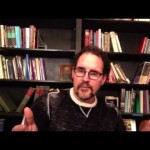We run our website the way we wished the whole internet worked: we provide high quality original content with no ads. We are funded solely by your direct support. Please consider supporting this project.
How do you respond to Daniel 2:31–45?
Daniel interprets Nebuchadnezzar’s dream to the effect that he possesses a kingdom of “gold” (vs. 38). After this there shall arise “another kingdom inferior to yours, and yet a third kingdom of bronze which shall rule over the whole earth. And there shall be a fourth kingdom, strong as iron…it shall crush and shatter all these” (vs. 39–40).
There is a good deal of scholarly debate about which kingdoms Daniel is referring to, complicated by the fact that scholars even disagree over the dating and authorship of this work. This need not concern us, however. For the purposes of our present investigation we may grant that the text presupposes that God foreknows the succession and relative strength of several future kingdoms. Does this mean that everything about the future is settled and known by God as such? I don’t see why we should conclude this.
The Lord in his infinite wisdom is able to providentially determine the general duration and parameters of national powers without thereby determining or foreknowing what every free agent within those nations will do. God sovereignly outlines the skeletal structure of his providential plan and allows the decisions of free agents to flesh it out. A ship that is bound for the coast of Italy is in this sense predestined, though the people on the ship are free to move around as they please.
Perhaps a better analogy is to be found in a children’s “Choose Your Own Adventure” book. In these books an author writes a number of possible story lines and allows the reader to create their own story by choosing between them. The author provides a structure to the book as a whole as well as to each possible story line within the overall structure. But there is also room for freedom on the part of the reader to create their own story by choosing between the alternatives that the author has given.
This is a model (albeit, radically simplified) of how we may understand God’s sovereign design allowing for some openness in the future. The “God of the possible” is the author and governor of the whole story line of creation as well as the one who offers various possible alternatives to his human creations. The rise and fall of nations, it seems, is usually providentially guided according to God’s plans for world history (cf. Dan. 2:20). But within this general guidance there is plenty of room for individuals to exercise free will.
Along these lines, Paul proclaims that God “made all the nations to inhabit the whole earth, and he allotted the times of their existence and the boundaries of the places where they would live” (Acts 17:26). This is part of the structural outline of God’s plan for world history. These providential parameters certainly condition the scope of human freedom, but they do not destroy it—just as our genes and environment condition our individual freedom without destroying it.
Paul himself says that God sets up these times and boundaries for nations with the hope “that they [the nations] would search for God and perhaps grope for him and find him” (Acts 17:27). There is, we see, ordained structure balanced by freedom. God determines whatever he sees fit and leaves as much of the future open to a “perhaps” as he sees fit. The “God of the possible” creates the “Choose Your Own Adventure” skeletal outline of world history within which the possibilities of human free choice are actualized.
Category: Q&A
Tags: Open Theism, Q&A
Topics: Open Theism, Responding to Objections
Verse: Daniel 2
Related Reading

What is the significance of Acts 27:10-44?
This is the passage deal with Paul’s ill-fated voyage to Italy as a prisoner. The ship ran into very bad weather and Paul announced, “Men, I can see that our voyage is going to be disastrous and bring great loss to ship and cargo, and to our own lives also” (vs. 10). As he reminded…

What about the thief on the cross?
Question: You hold that most people who are saved will nevertheless have to go through a “purging fire” to have their character refined and fit for heaven. Whatever is unfinished in our “sanctification” in this epoch must be completed in the next. But how does this square with Jesus telling the thief on the cross,…

What is the significance of Exodus 16:4?
The Lord commands the Israelites to gather only enough bread for one day while in the wilderness. “In that way,” the Lord says, “I will test them, whether they will follow my instruction or not.” Testing people to find out how they will resolve their character only makes sense if God is not certain of…

When Did You Let Go of Your Calvinist Beliefs? (Podcast)
Greg talks about his unusual transformation out of Calvinism. Episode 471 The Interview: http://traffic.libsyn.com/askgregboyd/Episode_0471.mp3 Photo by Paola Franco on Unsplash.com

Lighten Up: Oh my… I am so very very scared…
Well, my dear friend Frankie V. once again has a bad case of verbal diarrhea (explains his breath lately), running off about how he’s going to smack me down in our “all-out, no holds barred, ring-side seat, verbal wrestling match” on the open view of the future. I’m supposed to shutter in my boots at…

Free Will: An Aesthetic Model
Greg continues his thoughts on free will by offering an aesthetic model for free will. This one gets pretty philosophical, but it’s worth toughing it out.
